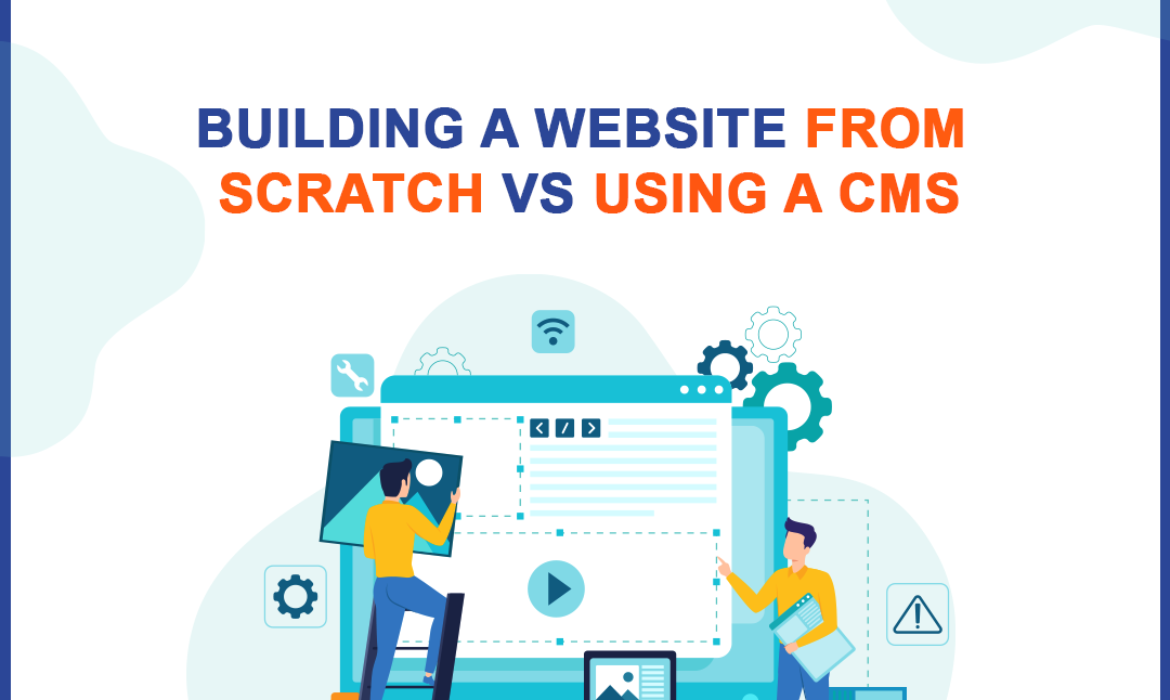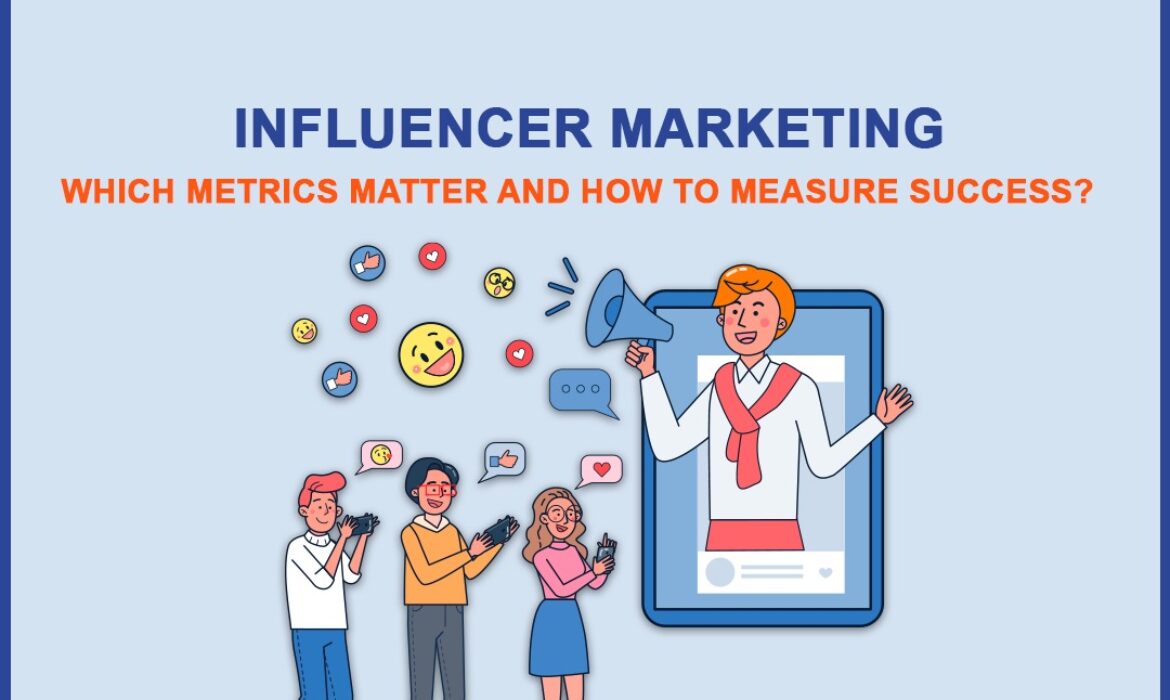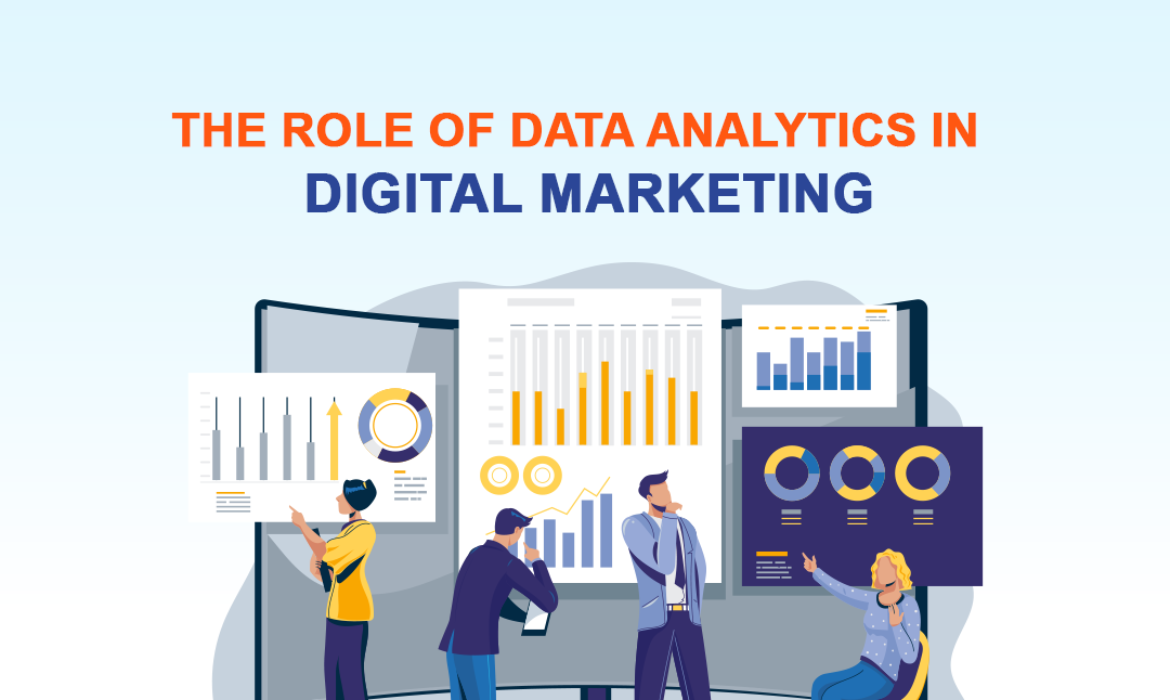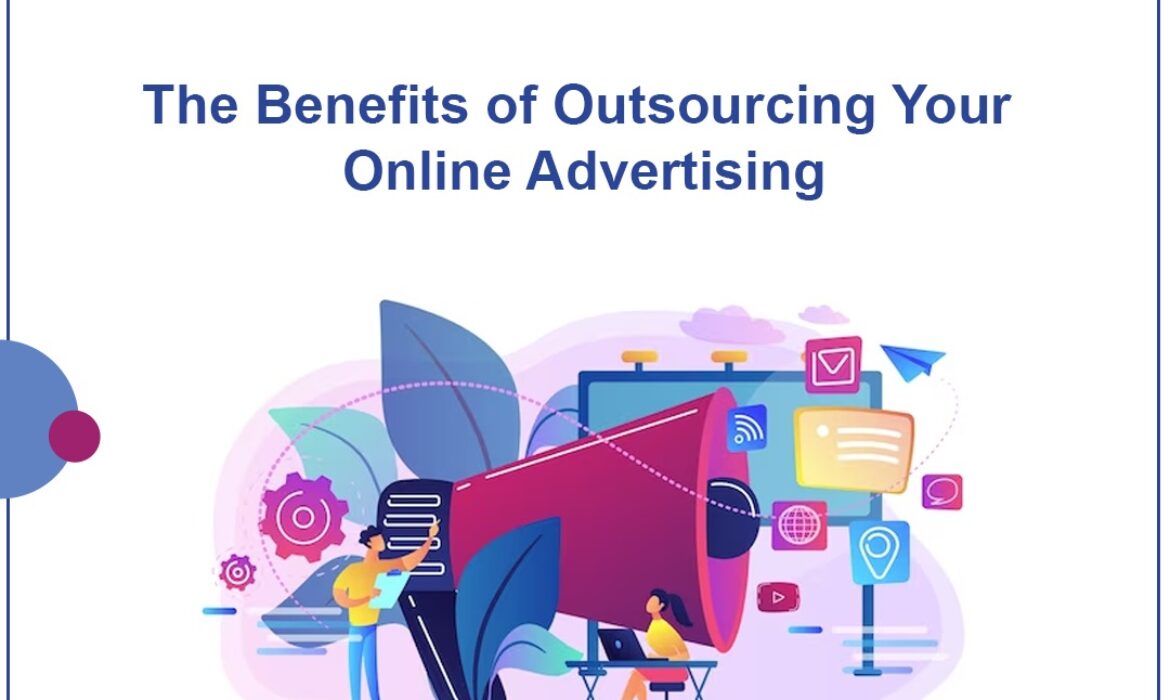Building a website from scratch VS using a CMS
The first decision you will need to make after coming up with a website idea is whether to use a CMS or custom development. Content Management Systems make the process of constructing a website much easier and frequently less expensive than building it from scratch. It also takes less time to deploy pages created with CMS platforms. At the same time, a custom-built site will be more robust, secure, and visually distinct than one created using a CMS.

What’s the Difference Between CMS and Custom Development?
A content management system (CMS) is a piece of pre-configured software that already incorporates the many functionalities required to construct and manage a website. These platforms are packaged with a variety of themes and plugins to facilitate customizing and saves the time required to tailor the platform to your individual requirements. Overall, a CMS enables people with no technical knowledge to quickly design and publish beautiful and functioning websites.
Building a website from the ground up, on the other hand, is a time-consuming and difficult task. To accomplish this, developers employ open-source tools and frameworks while customizing the majority of the code for each customer. In most circumstances, building a website from scratch allows you to have a more original, secure, and trustworthy system. Furthermore, depending on your needs, custom development may be the only realistic choice to accommodate for the intricacy of your system. To build a website from the ground up, you must have deep knowledge of web design and programming to construct the backend logic. You might also need to hire a software development business to build the site for you.
Price: Using a CMS is less expensive than custom development. Despite having access to a plethora of libraries, frameworks, and reusable code components, engineers will create the architecture from scratch, which will stretch your budget further than a less flexible but fully functional CMS. If cost is the decisive element in your decision, you should be prepared to go with a CMS. However, it is always a good idea to contact a software development business and describe your proposal in order to obtain quotes. Without prior knowledge in the sector, it might be difficult to precisely estimate the cost of your project.
Performance and User Experience: Overall, a website built from the ground up outperforms its CMS counterpart. CMS platforms produce comparable outcomes on small projects with little user traffic and simple functionality. However, as your company grows, you may realize that improved performance, design, and efficiency are required to improve user experience.
CMS platforms sometimes perform worse than custom-built websites due to the quantity of capabilities packed into them, regardless of the functionality you choose to use.
CMS vs Custom Development Scalability: All CMS systems have standard functionalities. Because you may use pre-coded pieces instead of building them from scratch, they are quite handy in the early stages. However, this advantage of CMS platforms quickly becomes a disadvantage when users seek to integrate more complicated features, increase site speed, or expand site availability. As your company grows, so will your website, and CMS platforms are not suited to providing truly scalable solutions.
Custom-built sites are not impervious to scalability; they are just as prone to underperformance and being a nuisance to update or modify. Nonetheless, high-quality tailored solutions will be more comfortable and less expensive to modify when the need arises.
Security: In a conventional CMS, the platform’s provider is responsible for ensuring the appropriate security. On the one hand, it’s convenient because you don’t have to spend money establishing and maintaining the site’s security. On the other hand, the level of security frequently falls short, owing to the fact that huge CMS platforms with standard security policies become easy targets. Furthermore, your CMS will rely on many plugins provided by third-party firms, each of which may pose security issues.
Custom creation pays careful attention to security in each individual scenario, ensuring that your website has adequate and up-to-date protection at all times.
CMS vs Custom Development – What to Choose?
In the end, custom development will always be superior to using a CMS. Having a page constructed precisely to your specifications will pay off in a more beautiful design and flawless working in the great majority of cases, regardless of how tiny your website is or what purpose it serves. Websites that are created from scratch are also more secure and scalable. They function not only as a showcase for your items, but also as an extension of your brand. If your budget permits it, hiring a professional development team to design you a site from the ground up is likely to provide greater benefits than spending time adjusting a CMS.
A CMS, on the other hand, can be extremely beneficial to companies, artists, bloggers, e-commerce businesses and other producers who do not need outstanding distinctiveness or capability. When you are just starting out it can be a good choice as the pre built themes – both free and paid provide nice designs with all required functionalities so you don’t have to worry about little details. Moreover CMS is a wonderful choice to create a simple, appealing, and inexpensive fully functional website. If your customer base grows in the future and you require a more scalable solution, you may always go with bespoke development.
References:
Influencer Marketing: Which Metrics Matter and How to Measure Success?
Influencers can provide tremendous value to a marketing campaign. High-quality content is used by top-tier influencers which helps to start organic conversations about a company with its target demographic. Businesses gain exposure at the very least, but many businesses desire more. They want to see a clear relationship between influencers and sales.

If you use or are thinking about using influencer marketing in your marketing strategy, you must track your metrics to ensure it is a cost-effective marketing channel for you. We’ve determined the crucial parameters to monitor in order to evaluate your performance.
1. Return on Investment (ROI):
The basic measure to monitor while operating influencer marketing programmes is return on investment (ROI). ROI is simply the revenue or profit earned by an influencer campaign divided by its cost.
By keeping a close eye on the ROI, you will understand exactly which influencer is helping your brand get more reach and engagement and ultimately, driving more sales.
2. Cost per Acquisition (CPA):
CPA, or cost per acquisition, is the amount of money spent to acquire a single customer. Influencer marketing campaigns allow you to calculate the acquisition cost based on how much you pay the influencer.
Checking the CPA rates of influencers beforehand will help you choose the right influencer for your brand.
3. Brand Awareness:
We often end up buying the products of our favorite influencers or celebrities.
Happened with you too?
Well, this is the power of influencers!
While choosing influencers for your brand, make thorough checks on their profile, their followers, their engagement rate, etc. This will help you to understand how far you can build your brand awareness based on that particular influencer!
4. Website Visitors:
By making the use of Google Analytics, you will be able to understand how many repeat visitors you have on your website and also the new visitors on your website after the influencer campaign.
Based on the data, you can re-target your repeat customers through offers and offer special discounts and coupons like introductory offers and/or welcome offers for your new customers.
5. Engagement Rate:
You should always look out for the amount of reach and engagement an influencer has brought.
By doing this, you will exactly know what impact a particular influencer has produced on your brand.
Track influencer content in particular to track likes, shares, and backlinks (i.e., how many times other sites mention your content). You should also check at the content’s comments for information regarding its attractiveness or what people liked/didn’t like about it.
6. Influencer Engagement Rate (IER):
The influence engagement rate (IER) is the proportion of engagements to followers that influencers had at the time they posted your campaign. The higher the IER, the more relevant your message was to their target audience.
Use this to locate other influencers, such as those who provide you with high IERs.
Summary:
When done correctly, influencer marketing may help you develop brand awareness, expand your reach, generate sales, and engage new audiences. When working with influencers, it is critical that you have the necessary tools to track their influence so that you can identify where to devote more resources in the future.
Remember that influencer marketing is not a one-time event. It takes time and nurture for results to appear. However, by tracking the indicators listed above, you may determine which influencers provide positive ROI and improve your performance over time.
The Role of Data Analytics in Digital Marketing
Data has been fundamental in the birth and advancement of digital marketing. We think of it as the fuel that powers the engine of digital marketing. The quality of data you have and what you deduce from it, on the other hand, influences the success of your digital marketing activities. This results in a massive digital footprint, allowing advertisers to put their best foot forward by analyzing customer behavior.

The Psychology of Marketing
Marketing has always been about understanding client behavior, introducing relevant offerings, and targeting them to ultimately make more sales. However, data has added much-needed accuracy to being in the right place at the right time for the right person. Previously, a lot of marketing activities were based on guessing game because there were no ready-to-consume statistics, such as, did the sentiments work? Is the content interesting enough? Is the consumer segmentation accurate? What was the end user’s most used and engagement-driven journey to be satisfied and give us business?
Gone are the days of creating a product and then looking for buyers. With the superpower that data possesses, digital marketing analytics may assist in acquiring access to who (will buy), what (will serve), and where (will sell) of your target market. These three crucial inputs will help you in building a product which solves a common day problem for your audience, making their life easier!
How Data makes your life easier?
Companies today want to engage with their customers and acquire their loyalty in order to strengthen their presence. Loyal customers are more likely to order from you multiple times. Having a stand-out product or a service is important but how you make your clients feel appreciated and demonstrate that you have solutions to their problems is equally important. Personalized communication matters as it makes your customers feel special and builds trust!
Data has helped us to categorize clients, create user personas that are appropriate for a specific product, and then target them at their preferred touch point. As a result, a long-lasting link is formed that establishes the connection and targets your potential customers with your ads.
Digital marketing analytics allows you to measure not only the efforts that have worked for you, but also those that have not (which is a bigger learning in understanding what NOT to do). User journey, organic, and campaign-level efforts can all be tracked.
Why use Digital Marketing Analytics?
Brands may use digital marketing analytics to make more data driven decisions about what they should do to make it work for them. The analytics show what type of content is working for you, what isn’t hence, it’s up to you to understand the analytics properly before going forward.
We believe that evaluating the accuracy and quality of the data needed to create a strategy, as well as how to make sense of the massive data lake in front of you, is an area that requires a significant amount of work. We believe there is a growing need to collaborate with data scientists, and this is true across industries, to have someone who can extract important data and make sense of it. This approach can assist you in developing a suitable marketing plan, rather than collecting irrelevant data, engaging in marketing efforts, and then being dissatisfied when the desired outcome is not obtained.
Data analytics is now allowing brands to leverage massive data sets to construct predictive models for digital marketing operations. With the rise of Machine Learning and Artificial Intelligence in data analytics, the future will only offer new competencies to better deduce data in order to acquire rich actionable insights that can aid digital marketing in reaching improved outcomes.
The Benefits of Outsourcing Your Online Advertising: Why Working with a Digital Marketing Agency Makes Sense?
A digital marketing agency employs an experienced staff to manage all of your internet marketing needs from a single location, allowing you to concentrate your efforts on running and developing your business. That is only one reason to work with a digital marketing agency.
But you’d like to save some money. Or you’re an industry expert who doesn’t believe an agency can contribute any value. In any case, there are numerous benefits to working with a digital marketing agency.

1. A digital marketing agency will help you expand your business online
If this pandemic has taught entrepreneurs anything, it is that businesses that do not go digital risk failing or falling behind. That’s all there is to it. However, if your company has been primarily offline up to this point, establishing an online presence will necessitate a significant time investment. You may need to create and publish a website, begin running social media ads, send out newsletters to your subscribers, and so on. A digital marketing agency can take care of all of your hectic work so you can focus on what you do best.
2. A digital marketing agency will bring you more customers
When you run your own pay-per-click advertising on sites like Facebook, Google, or Instagram, you simply have to pay for ad space. However, you are also paying a digital marketing agency to help your ads seem better and reach more potential clients.
This may appear to be a cost, but it is truly an investment. Hiring a competent digital marketing agency can ensure that your ads not only break even but create a good positive return on ad spend.
3. Hiring a digital marketing agency lets you focus on what you do best
Your strengths are the things you can offer that other businesses cannot.
Learning digital marketing from scratch can be time consuming. With no expertise in the area, you might have to do a lot of trial and error to find out what exactly works for you. But, this doesn’t necessarily happen with handing over your online marketing to the agency for they have expertise with other clients, know what’s trending these days, know the market and hence is a perfect fit for your business to expect immediate results.
Even if you have funds to hire a full time digital marketing manager, owning the tools an agency has for content research and planning, content creation, scheduling, planning might be a nightmare for it takes a lot of money to even buy a basic plan of these tools at the beginning. Plus, the hustle of learning how and when to use these tools is tremendous work.
Even if you have funds to hire a full time digital marketing manager, owning the tools an agency has for content research and planning, content creation, scheduling, planning might be a nightmare for it takes a lot of money to even buy a basic plan of these tools at the beginning. Plus, the hustle of learning how and when to use these tools is tremendous work.
Here are some of the resources we are referring to:
- Content research tools and plan
- Competitor analysis
- SEO optimization techniques
- Grammar/plagiarism checkers
- Automation tools
- Educational courses
- Website development tools, technology, and plug-ins
These resources all have monthly subscription costs or large one-time expenses. This is not to say that you cannot undertake marketing initiatives on your own. However, doing it at the same level will take considerably longer and cost much more money.
Having difficulty justifying the expense of a digital marketing agency? Consider the return on investment. Often, the ROI of a digital marketing agency will pay the cost of the service by allowing you to access an untapped market that you would not have been able to contact otherwise.
4. You can rest easy knowing that everything is handled by professionals
So far, we’ve proven that doing everything yourself may result in overwork and hiring a full-time employee will cost more than engaging an agency. Even if you hire an unskilled individual, you will still need to train them, which will cost money.
Instead when you engage a digital marketing firm, you won’t have to worry about finding the correct people because the companies already have a team of highly skilled players. This saves you time and money, which you can reinvest in expanding your marketing activities.
Finally, outsourcing your online advertising to a digital marketing agency provides numerous advantages, such as access to expertise and experience, cost-effectiveness, the ability to focus on core competencies, access to advanced tools, scalability, measurable results, and the advantage of staying ahead of the competition. You may optimize your online advertising efforts, attract targeted visitors to your website, and achieve the required outcomes by collaborating with a digital marketing agency.
So, what are you waiting for?
Join hands with us today and level up your game in business!






